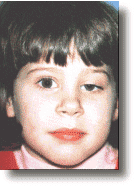| 
| EYELID DROOPING
PTOSIS | | EPSA | Several problems can lead to drooping of the upper eyelids, called ptosis (toe-sis). Some people are born with this condition, and live their lives with no complaints or symptoms. This may not even be a cosmetic problem, if it is symetrical between the two eyes (as in some photos of Marilyn Monroe). However, for people who develop worsening ptosis in one eye or the other, it can become a battle to keep the eyes open. Significant ptosis of the upper lids can block the upper field of vision. Causes include: - Aging changes - in some people the muscle that lifts the upper eyelid slips back with time and the eyelid droops.
- Trauma - a blow to the eye or a laceration can damage or disinsert the muscle controlling the height of the eyelid.
- Eye surgery - for an unknown reason, some people will develop ptosis after catarct surgery, or other eye surgeries.
- Myasthenia gravis - this unusual disorder leads to temporary often severe drooping of one eyelid. At other times, the height of the lids can be completely normal. This may be associated with muscle weakness and fatigue, and it is treatable with medication.
- Nerve paralysis - one of the nerves that control eye movement also controls the muscle which lifts the eyelid. If the affected eyelid is raised, usually the person will have double vision. Another condition called "Horner's syndrome" can cause this also, along with a small pupil on one side. Both of these conditions need prompt evaluation by a ophthalmologist.
- Brow ptosis - in this condition, common in men, the entire brow area drops down. If folds of skin then block the vision, surgical correction can be done.
- Some people develop loose overhanging skin of the eyelids, or develop pockets of fat which protrude and bulge in the eyelids. This can be corrected surgically if necessary or desired.
Ptosis which encroaches on the pupil and is blocking the upper field of vision can be surgically corrected. Less severe ptosis can be corrected with cosmetic surgery. | | epsa | | We regret that we cannot give specific advice and answers to patient's medical questions over the internet. All pages on this site and their content are provided as information only and do not constitute medical advice. | |

